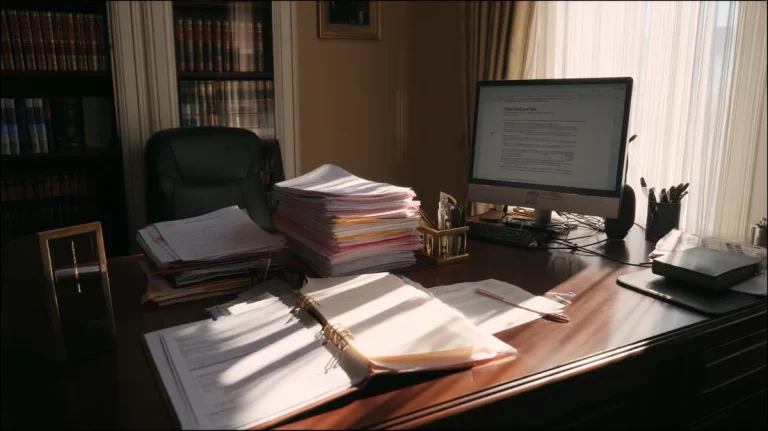When a deceased person leaves behind money, real property, and keepsakes, someone has to step in and wrap things up. If the will names an executor, great, the job is already spoken for.
But if the person died without a valid will, or the named executor can’t serve, the probate court steps in and appoints an administrator of estate (sometimes called an estate administrator or “personal representative”).
Under state law, that person gets a court order called “letters of administration,” giving them the power to act on behalf of the estate and its beneficiaries.
Unlike a named executor, an administrator is appointed by the court only after a judge is satisfied that the candidate, often a surviving spouse, adult child, or trusted relative, can handle the assignment.
The role isn’t honorary; it’s work. The administrator must gather every asset, pay every debt, and make sure whatever is left reaches each heir in line with state law. Failure to do so can trigger personal liability, so understanding the job up front matters.
The Role of an Administrator
Once the court order arrives, the administrator’s first chore is inventory: bank accounts, life-insurance proceeds, retirement funds, household goods, business interests. Every dollar and doily counts as part of the assets of the estate. That inventory anchors the rest of the estate administration process.
Next comes the hard check on what the estate must be paid: final utility bills, credit cards, medical invoices, and, yes, the estate tax if the size of the estate crosses federal or state thresholds. Only after those numbers settle can the administrator start distributing assets to beneficiaries. If the estate owns a vacation cabin nobody wants to keep, the administrator may have to sell the property so the proceeds can be divided fairly.
Throughout, the administrator must keep receipts, file interim reports, and sometimes secure a death certificate or a new Tax ID so the IRS knows who is filing returns. They also need to follow any restrictions laid out by the judge, because administrators “must follow” court instructions to remain in good standing.
The golden rule is the fiduciary duty to “act in the best interests of the estate and its beneficiaries,” meaning personal feelings step aside in favor of what’s best for the estate.
When is an Administrator Needed?
Every estate travels a unique path, but certain triggers push the court to appoint an administrator:
Situations Without a Will
If someone dies intestate (the legal term for leaving no will), the court has no “named executor” to lean on. In that vacuum, the judge looks at the statutory pecking order: surviving spouse, adult children, parents, then further kin.
The first person appointed by the probate court who meets statutory qualifications becomes the administrator.
Disputes or Complications
Even when a will exists, families fight.
Maybe siblings disagree on who should serve, or the named executor moved abroad, developed dementia, or declines the job. In those moments, the judge can remove or bypass that nominee and appoint an administrator of the estate who can navigate the turbulence.
In hotly contested cases, a neutral third-party, like a bank trust officer, gets tapped so nobody cries favoritism.
How to Become an Administrator of an Estate
Anyone eyeing the role has to clear two hurdles: eligibility and paperwork.
Eligibility boils down to capacity and character. Minors, convicted felons, or people who live out of state without a resident co-administrator usually strike out. Courts look for someone “experienced estate” hands, or at least organized enough to handle deadlines.
The Appointment Process
The path starts with petitioning the probate court. The prospective administrator files a written request, attaches the death certificate, lists the estimated value of the estate, and asks for letters of administration so they can legally act on behalf of the estate and its beneficiaries.
After the petition is filed, the court clerk sends formal notice to every known heir and creditor. Anyone who objects to the candidate or thinks someone else should handle the job can appear and argue their case, and the judge weighs those concerns before making a decision that is best for the estate.
Once any objections are settled, the judge signs an order appointing an administrator, and the clerk issues the letters. Those letters are the administrator’s badge of authority, allowing them to open estate bank accounts, retitle vehicles, or sell property that the estate cannot keep.
In many states, the judge also requires a surety bond as a safeguard so the estate can be reimbursed if mistakes or misconduct occur.
Challenges Faced by Administrators
Handling the estate after the death of a loved one isn’t sunny work.
Deadlines collide with grief. Handling the estate may mean sifting through boxes of paperwork, deciphering Mom’s password notebook, and explaining probate fees to frustrated siblings.
Complex portfolios make things tougher. A business interest or out-of-state cabin drags in extra filings. Throw in an heir who disagrees with valuations, and the administrator may find themselves defending every decision. Mediation sessions, formal accountings, and even lawsuits pop up, lengthening the probate proceeding and adding attorney’s fees that must be paid before heirs see a dime.
Time is another hurdle. Courts often set milestones. 90 days for an inventory, one year for final distribution. A busy professional serving as an administrator can feel chained to courthouse calendars, accountants, and title companies.
How an Administrator Differs from an Executor
At first glance, the two roles mirror each other: both manage the estate, chase creditors, file taxes, and ultimately distribute the estate.
The core difference between an administrator and an executor is how they get the job.
An executor springs to life the minute the person dies, thanks to a clause in the will. An administrator “may be appointed” only by judicial decree, and until those letters arrive, they can’t sign checks or listings, even if every heir begs them to hurry.
Because an executor is the testator’s hand-picked choice, courts rarely second-guess them unless misconduct appears. An administrator, being court-appointed, answers directly to the court from day one, often under closer supervision.
FAQ’s About Administrator of an Estate
Yes. A judge can “appoint an administrator” and a co-administrator, or honor a will naming co-executors. Multiple heads can shoulder the work, though disagreements sometimes slow things down.
Usually, yes. Most states allow reasonable commissions tied to the value of the estate, or a flat fee approved by the judge. Payment comes on behalf of the estate, so heirs foot the bill collectively.
If an administrator slips up and the estate loses money, they could be personally on the hook because they’re bound by fiduciary rules. Surety bonds and court oversight exist so the estate can be reimbursed if things unravel.
In some jurisdictions, a major creditor, such as a nursing home with a large unpaid bill, can petition to serve when no family steps forward. Courts weigh whether that choice is best for the estate and its heirs before signing off.
Simple cases wrap within a year, but estates with real property to sell, contested wills, or tax audits can run for several years. Deadlines vary by state law, and extensions are common when assets are illiquid.






